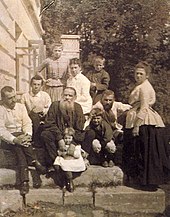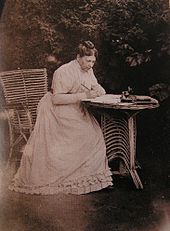Sofja Andreevna Tolstaya
Sophia Tolstoy ( Russian Софья Андреевна Толстая ; born August 22 jul. / 3. September 1844 greg. In Pokrovskoye-Streschnjowo , today Moscow belonging; died 4. November 1919 in Yasnaya Polyana ), was a Russian writer who nearly fifty Was married to Lev Tolstoy for years .
Life
Sofja Andrejewna Behrs grew up in the Kremlin in a family of German descent. Her great-grandfather Hans Behrs was sent by the Prussian king in the middle of the 18th century as an instructor in the army of Tsarina Elisabeth in Russia. Her father Andrei Evstafjewitsch Behrs (1808–1868) was an imperial court doctor with official residence in the Kremlin. The mother was Lyubov Alexandrowna Behrs, b. Islawina (1826-1886). Sofja was the second of three daughters.
In 1861 she graduated from Moscow University as a tutor . In the same year serfdom was lifted in Russia and hopes for liberalization of the tsarist empire grew in the Russian intelligentsia . When Sofja was eighteen years old, Tolstoy, 16 years her senior, who at the time was already known as a writer and who was an acquaintance of the family, proposed marriage to Sofja. The engagement time was less than a week, on September 23, 1862 they married in the Kremlin in the Cathedral of the Annunciation . Tolstaya moved to Tolstoy's estate Yasnaya Polyana . Sofja gave up her own literary ambitions and burned her writing attempts and diaries before the marriage. Tolstoy, in turn, gave her his diaries to read, from which she learned of his sexually dissolute life before marriage (he later processed this scene literarily in Anna Karenina and in Chapter 5 of the Kreutzer Sonata ).
Shortly after the marriage, Tolstoy began to write the novel War and Peace , supported by his wife, who transcribed the manuscript a total of seven times. Tolstaya performed her job as assistant and later as publisher of Tolstoy's works until his death.
Tolstaya was sixteen times pregnant but had three miscarriages . Of the thirteen children born alive , eight reached adulthood. A contraceptive rejected Tolstoy.
During the development phase of Anna Karenina , three of the children and two aunts died and Sofja became seriously ill, so that working together was not possible. In the late 1880s, the family bought a house as a residence in Moscow so that the children could get an education in the city. The couple became increasingly estranged. “ He went away, but not in everyday life, but in his writings, his sermons to people about how to live”.
The novel Die Kreutzer Sonata was written around 1890 . Tolstoy wrote the first version shortly after the ceremony on the occasion of the Silver Wedding. The work is about a pathologically jealous man who sees himself helplessly exposed to the temptation of female sexuality and who believes he can only free himself from the bonds of marriage and sensuality through murder. She is the source of his pleasure , he is the source of their livelihood . In the literary public, the wife of the Kreutzer Sonata was equated with Sofja. Although Tolstaya felt deeply humiliated by the depiction, she advocated the approval of the work by the censorship authorities with Tsar Alexander II . She wrote a literary reply to her husband's Kreutzer Sonata entitled “Whose Missing? A woman's story. (On the occasion of Lev Tolstoy's “Kreutzer Sonata”. Written down by Lev Tolstoy's wife in the years 1892/1893) ” . Tolstaja's novel wasn't published in Russia until 101 years later, 75 years after her death.
The crisis of the spouses became dramatic when the Tolstoy disciple Vladimir Chertkow urged Tolstoy at the end of 1909 to draw up a will in which he, Chertkow, was designated as sole administrator of Tolstoy's works. When Tolstaya found out about this by chance, she was outraged. Tolstoy left the Yasnaya Polyana estate because of the stressful situation of the conflict between his wife and Chertkow. On his journey he fell ill and died at the Astapovo train station , about 150 kilometers from Yasnaya Polyana, in the Ryazan Governorate . Tolstoy's legacy was withdrawn from the family due to the will drawn up under pressure from Chertkow.
Tolstaya left a large collection of his own photographs , as well as diaries and memories. Your literary answer to the “Kreutzer Sonata” was translated into German in 2008 under the title “ A Question of Guilt ” . Her short novel “ Song without Words ”, which she wrote between 1897–1900, was published in 2010 as a world premiere in German translation. The work has not yet been published in Russia.
Works
- Song without words . Translated from Russian by Ursula Keller , with an afterword by Natalja Sharandak. Manesse Verlag, Zurich 2010, ISBN 978-3-7175-2210-2 .
-
A question of guilt . Translated from Russian by Alfred Frank. Manesse Verlag, Zurich 2008, ISBN 978-3-7175-2150-1 .
- therein: Short autobiography of Countess Sofja Andrejewna Tolstaja dated October 28, 1913, translated by Ursula Keller, pp. 217–286.
- therein: Afterword by the editor Ursula Keller, pp. 299–315.
- My marriage to Leo Tolstoy : with 7 picture plates. u. 1 Bibliography d. Works by Leo Tolstoy, German by Bernhard Hirschberg-Schrader. C. Weller & Co. Verlag, Leipzig 1928, DNB 576696315 .
-
Diaries. From d. Soot. by Johanna Renate Döring-Smirnov u. Rosemarie Tietze . Athenaeum, Königstein / Ts. 1982.
- Diaries (Volume 1) 1862–1897 . Translated from the Russian by Johanna Renate Döring-Smirnov and Rosemarie Tietze. Nostrum Verlag, Mülheim ad Ruhr 2016, 396 pages, ISBN 978-3-9816465-4-2
- Diaries (2nd volume) 1898-1910 . Translated from the Russian by Johanna Renate Döring-Smirnov and Rosemarie Tietze. Nostrum Verlag, Mülheim ad Ruhr 2017, 409 pages, ISBN 978-3-9816465-5-9
- Leo Tolstoy: letters to his wife . Edited by Dimitrij Umansky. P. Zsolnay, Berlin / Vienna / Leipzig 1925, DNB 576697001 .
- Autobiography of Sophie Andreevna Tolstoy. engl. (online at archive.org)
literature
- Ursula Keller, Natalja Sharandak: Sofja Andrejewna Tolstaja. A life by Tolstoy's side. Insel-Verlag, Frankfurt a. M. / Leipzig 2009, ISBN 978-3-458-17408-0 .
- Lev Tolstoj - Sofja Tolstaja: A marriage in letters . Edited and translated from Russian by Ursula Keller, Natalja Sharandak. Insel Verlag, Berlin 2010, ISBN 978-3-458-17480-6 . (Preface reading sample pdf; 251 kB)
- Leah Bendavid-Val, Song without words: the photographs & diaries of countess Sophia Tolstoy. DC National Geographic, Washington 2007.
- Anne Edwards: The Tolstoy. War and Peace in a Russian Family. Ullstein, Frankfurt am Main 1988, ISBN 3-548-27563-X .
- Cynthia Asquith: A life with Tolstoj: The marriage d. Countess Sofja with Leo Tolstoj. Biederstein Verlag, Munich 1962.
- Alexandra Tolstoy, René Fülöp Miller (ed.): Tolstoy's flight and death. portrayed by his daughter Alexandra. With the letters and diaries of Leo Tolstoy, his wife, his doctor and his friends. The Russian orig. Documents were translated. by Vera Mitrofanoff-Demelič. Diogenes, Zurich 2008, ISBN 978-3-257-23670-5 .
- Gisela von Wysocki : Russian Wars of the Roses. Leo Tolstoy and Sofja Tolstaya. In: Literatures . Issue 11, 2008, pp. 24-28.
See also
- A Russian Summer ( The Last Station ), biopic with Helen Mirren in the role of Sofja Tolstaya.
Web links
- Literature by and about Sofja Andrejewna Tolstaja in the catalog of the German National Library
- Olga Martynova : The militant Countess , on Sofja Tolstaja's book A Question of Guilt , in: Die Zeit , May 14, 2009
- Thomas Hummitzsch: Corrections to a Russian icon . Review, in: Glanz & Elend. Magazine for literature and contemporary criticism
Individual evidence
- ↑ on the origin of the mother see: Keller / Sharandak: Sofja Tolstaja. A life by Tolstoy's side , p. 17 f.
- ^ "Short autobiography" , p. 226
- ↑ cf. on this Keller / Sharandak: Sofja Tolstaja. A life by Tolstoy's side , p. 79 ff.
- ↑ Ursula Keller, afterword p. 308.
- ^ "Short autobiography" , p. 250f
- ↑ see English Wikipedia : Vladimir Chertkov
| personal data | |
|---|---|
| SURNAME | Tolstaya, Sofja Andreevna |
| ALTERNATIVE NAMES | Толстая, Софья Андреевна (Cyrillic) |
| BRIEF DESCRIPTION | Russian author, wife of Leo Tolstoy |
| DATE OF BIRTH | September 3, 1844 |
| PLACE OF BIRTH | Pokrovskoye-Streschnjowo , today in Moscow |
| DATE OF DEATH | November 4, 1919 |
| Place of death | Yasnaya Polyana , Russia |



